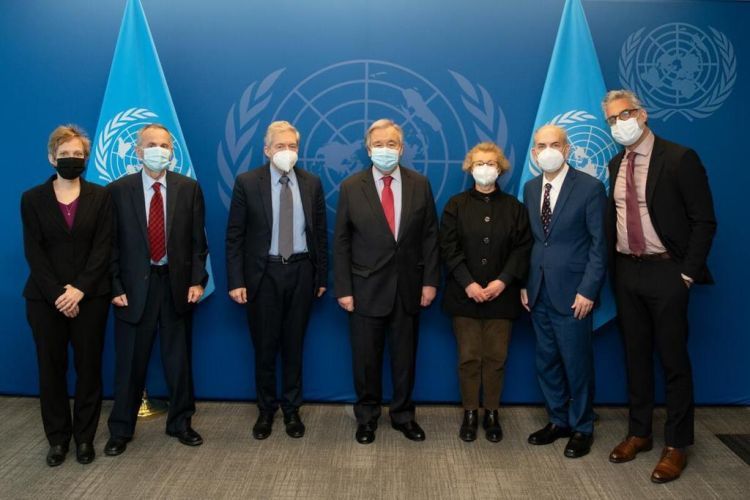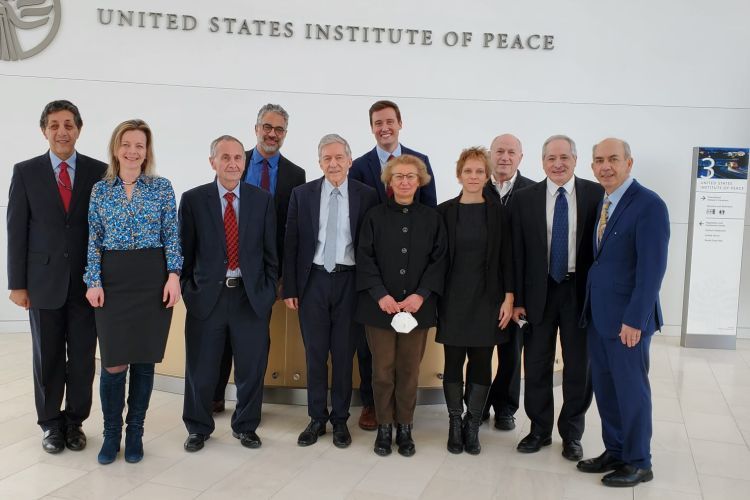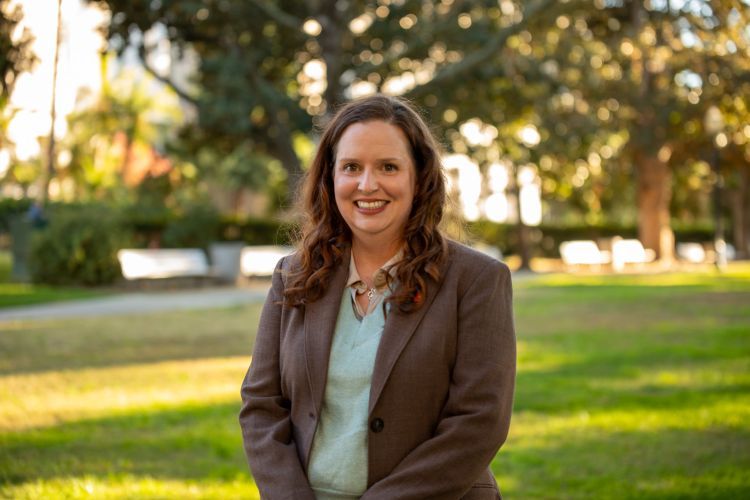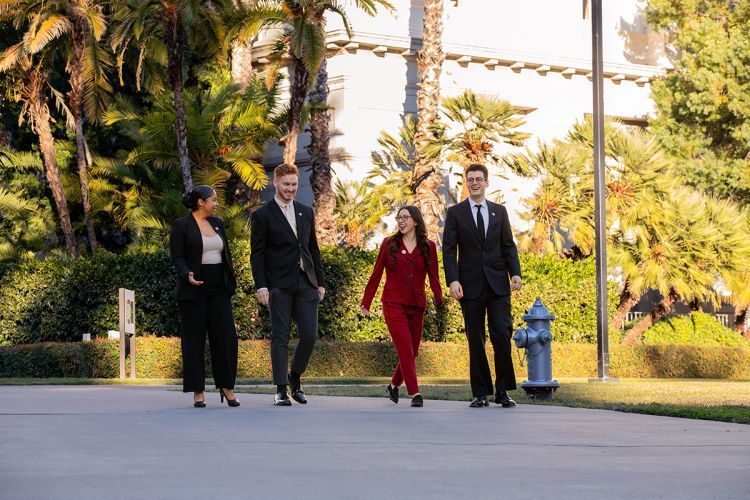Breadcrumb
McGeorge professor meets with world leaders, advances new model for peaceful resolution of Israeli-Palestinian conflict

Professor Omar Dajani (far right) met with the United Nations Secretary-General António Guterres (center) and his team in New York in February 2022
McGeorge School of Law Professor Omar Dajani recently traveled to Washington and New York to promote a study he contributed to this past summer. The study, The Holy Land Confederation as a Facilitator for a Two-State Solution, represents an effort by former Israeli and Palestinian negotiators and policy experts to explore what form an Israeli-Palestinian confederation might take.
During his recent trip to promote the study, Dajani accompanied Yossi Beilin, Hiba Husseini and others, to discuss the study with United Nations Secretary-General António Guterres. Beilin is a former Israeli justice minister and head of the Meretz Party, and Husseini is a prominent Palestinian lawyer. They also met with U.S. State Department officials and members of Congress, as well as analysts from a number of leading think tanks in Washington, D.C. – including the U.S. Institute of Peace, Brookings, and the Middle East Institute.
Dajani is recognized as a leading expert on legal aspects of the Palestinian-Israeli conflict. He has worked toward a peaceful resolution of the conflict for over 20 years. He previously served as a legal adviser to the Palestinian negotiating team in peace talks with Israel. He also worked on peacebuilding initiatives and played a lead role in marshaling and organizing international efforts to support Palestinian legal and political reforms through his work at the Office of the United Nations Special Coordinator for the Middle East Peace Process (UNSCO).
“I've been interested in the Israeli-Palestinian conflict since I was in undergrad, and I have been involved in different capacities since 1999 in efforts to make peace. I guess you could call it kind of an obsession,” Dajani said.
Dajani’s work on The Holy Land Confederation as a Facilitator for a Two-State Solution focused on questions of security, legal affairs, and exit from the contemplated confederation.
In the fall, Dajani participated in a roundtable discussion on confederation convened by the Harvard Law School’s program on Negotiation. Dajani has also explored these issues in a book chapter, co-authored with Israeli survey researcher Dahlia Scheindlin, entitled “’Stuck Together’: Can a Two-State Confederation End the Israeli-Palestinian Conflict?”
The chapter, along with a dozen other case studies, will be published this summer by Cambridge University Press in a book that Dajani is co-editing with UCLA Law Professor Aslı Bâli entitled “Federalism and Decentralization in the Contemporary Middle East.'' Dajani’s article, “Divorce without Separation: Reimagining the 2-State Solution," 15 Ethnopolitics 366 (2016), also considers confederal models for Israel-Palestine.

Professor Omar Dajani (fourth from the left) met with U.S. Institute of Peace leaders in Washington, D.C. last month.
At McGeorge School of Law, Dajani is the co-director of the Global Center for Business & Development and International Certificate of Concentration. The courses he teaches include Public International Law, Constitutional Law, Contracts, and International Negotiations.
In class, Dajani often draws on his experiences as a legal adviser in peace talks. Describing one case study he created using minutes from international water negotiations, he said, “I wanted to give my students a sense of the way in which parties in high stakes peace talks talk about law, how to use law, and how they fail to use law” adding, “I was really impressed by my students’ thoughts and questions about the challenges to advancing peace.”
In recent years, Dajani has taken interest in alternatives to the two-state solution, whose political viability has faced increasing challenges.
Dajani’s 2014 study with Hiba Husseini, entitled “Past the Point of No Return? A Rights-Based Framework for International Engagement in Israel/Palestine,” advocates a law-based approach to resolving the conflict. His 2017 article with Hugh Lovatt, “Rethinking Oslo: How Europe Can Promote Peace in Israel-Palestine,” explores the shortcomings of the jurisdictional framework established by Israel and the Palestine Liberation Organization in the Oslo Agreements.
Dajani always had an interest in teaching, even before his time at the United Nations. Although advocating for justice and peace was important to him, he realized that he would be able to continue doing that work as a professor, but with more institutional independence and the opportunity to learn constantly. He sees his students as a source of inspiration.
“In teaching, I find a way of restoring my faith in humanity,” Dajani said.
This summer, Dajani plans to head to the Middle East, where he will continue his work on confederal models for Israel-Palestine and begin recording a podcast. Co-hosted with Carleton University Professor Mira Sucharov, the podcast will tell the story of the Israeli-Palestinian conflict through the experience of the city of Jaffa, which Dajani’s family once called home.
“One audience we particularly hope to reach is progressive young Americans who are interested in Israel-Palestine, but find it difficult to make sense of it,” Dajani said. “I’m excited to find new ways to tell the story.”
For more information about McGeorge School of Law, visit law.pacific.edu/law.
Media Contact: Ashley Golledge, Director of Marketing and Communications, agolledge@pacific.edu, 916.325.4687.





